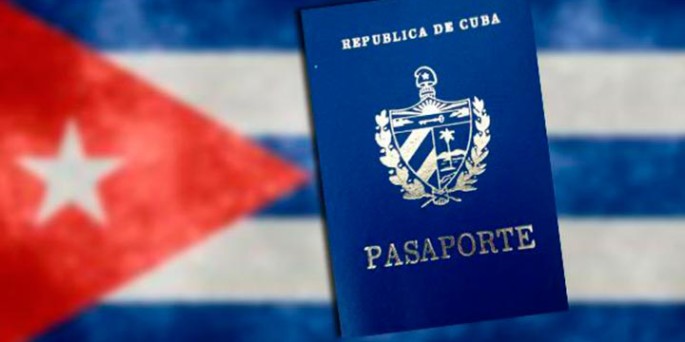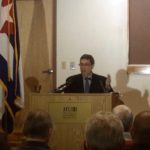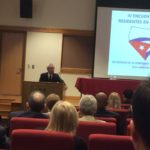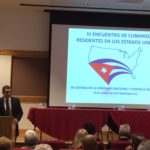
The weekend news was good, but the Cuban passport is still way too expensive
Eusebio Leal Spengler is Havana’s city historian. He is a man of great eloquence and extraordinary knowledge. If you’ve had the privilege of hearing him speak you know exactly what I am talking about. He is a delight to listen to and possesses a fountain of information that makes you proud to be a Cuban.
This past Saturday (Oct. 28), Leal Spengler was the featured speaker at the Fourth Meeting of Cubans Residing in the U.S. held in Washington, D.C. Attended by approximately 130 Cubans who live in numerous states as geographically diverse as California, New York, Florida and Louisiana, Spengler did not disappoint, but he was upstaged by a surprise guest, and speaker, Cuba’s foreign minister Bruno Rodríguez Parrilla.
In an approximately 30 minute speech, Cuba’s foreign minister announced that certain changes had been approved that dealt directly with Cubans who had migrated — many who live in the U.S. His announcements were met with positive reactions from the crowd. The oohs! and ahhs! dealt with Cuba’s decision, starting January 1, to:
- Eliminate the “Habilitación” (authorization) of passports previously required of Cuban émigrés traveling to the country;
- Authorize the entrance and departure, to and from Cuba, of Cuban citizens residing abroad on recreational vessels, via the international tourist marinas Hemingway and Gaviota-Varadero. It was also announced that once conditions have been created, this option will be gradually expanded to other marinas;
- Permit entrance to the country of Cuban citizens who left illegally, with the exception of those who did so via the United States Naval Base in Guantánamo;
- Eliminate the requirement of “avecindamiento” (residence in Cuba for 90 days) for children of Cubans residing abroad, who were born outside the country, to obtain Cuban citizenship and identification documents.
The news without a doubt was positive. All the new measures were important, but two of the announcements, I believe, were most important. First, the ability of those who left the country illegally to return. In the recent past they had to have spent eight years away before they could visit. Secondly, the ability of the children of Cubans, born outside of Cuba, to obtain Cuban citizenship and identification.
What’s the big deal with children of Cubans becoming citizens? I asked that question to someone in the know who explained that it was of utmost importance to Cubans living elsewhere — for example, France and Germany — who can never become citizens of those countries and whose children, therefore, are country-less as they live and travel on this earth. This measure allows them a passport which should facilitate their lives going forward, and gives them an important identity.
The discussion before Bruno’s arrival
It is important to note that before lunch, during the meeting, the most asked about issue, by far, was the Cuban passport we purchase here in the U.S. As I’ve written in the past, it is probably the most expensive passport in the world — and lasts for only six years during which time you must extend it every two years. In other words, I will pay (in round numbers) about $400 for my passport which lasts me six years, but requires an extension after the second and fourth year — each extension costing approximately $200. The fact is that the cost of the passport keeps many Cubans living here from visiting their homeland — simply because they can’t afford it. Over a 10-year term, we’re talking approximately fourteen hundred dollars!
I say reduce the cost and extend the years. Yes, in the short term it would hurt — economically. But in the long run, and not very far into the near future, the money lost would be recuperated many-fold by the thousands of new Cuban travelers living in the U.S. who have not obtained their passport simply because they can’t afford it. There are others, and I know a few, who simply refuse to spend the money in protest of the cost.
This discussion dominated the morning session — inside and outside the meeting room. Interestingly, the Cuban consul asked that the discussion be held off till the afternoon during the immigration session. He also admitted that many of these ideas are being studied and under consideration. Honestly, the “under study and consideration” explanation is the same I’ve heard since I can’t even remember any more. And I mentioned interestingly because by the time we should have discussed the issue further Bruno arrived and his speech basically closed the meeting and the immigration discussion…
One last thought that might be helpful in the Trump era as the U.S. regime imposes travel restrictions on U.S. citizens who want to visit family members in Cuba. Why not allow Cuban-born U.S. citizens to travel with their U.S. passports? That would be a win-win for Cuba, and a travel visa to Cuba runs around $50, a bit more under certain circumstances. Havana’s streets would then surely be flooded with Cuban American travelers from many places in the U.S. interested in reconnecting with their homeland.
Of course, that’s my take on the issue, and who am I to say…





